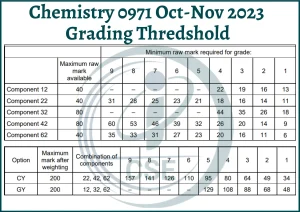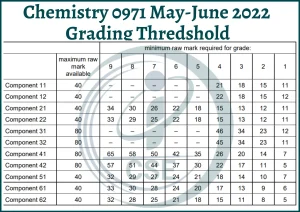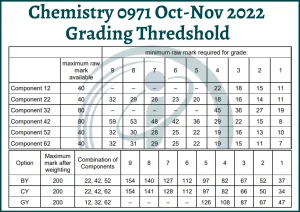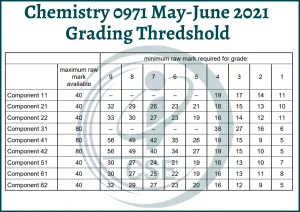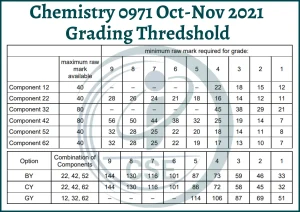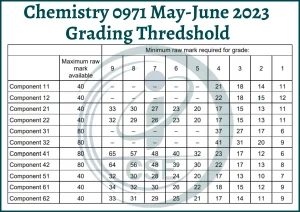Cambridge IGCSE Chemistry-0971 (9-1) Past papers
Cambridge IGCSE Chemistry-0971 (9-1) past papers helped me to gain high scores in the final examination. The IGCSE Chemistry-0971 (9-1) specimen is arranged to teach me about the technological world we live in and the fundamental competencies of chemistry, different chemical reactions, and their applications in daily life. Its specimen enables me to improve my practical skills with its amazing specimen. I learned the concepts of bonding, octet rule, chemical equilibrium, periodic rules, and chemistry’s role in advancing technology. I prepared past papers for Cambridge IGCSE Chemistry-0971 (9-1) past papers to cover all important topics from the syllabus.
Its grading scale is 9 to 1. With its specimen, I got the chance to improve my problem-solving skills, establish my career as a chemist, and offer my research services. Its practical applications enable me to choose this subject for my future. education. My teachers also helped me prepare its syllabus, clear my concepts, and make me perform well in the final examination of IGCSE Chemistry-0971. You should also prepare Art and Design -0400 past papers
Download Cambridge IGCSE Chemistry-0971 (9-1) Past papers
Its grading scale is 9 to 1. With its specimen, I got the chance to improve my problem-solving skills, establish my career as a chemist, and offer my research services. Its practical applications enable me to choose this subject for my future. education. My teachers also helped me prepare its syllabus, clear my concepts, and make me perform well in the final examination of IGCSE Chemistry-0971.
Assessment structure
Cambridge assessed the species of Chemistry using two methodologies. coursework and practical assessment. For coursework assessment, it arranges papers 1 and 2, which are completely MCQ-based. There are 40 multiple choices in each paper. The coursework knowledge is also assessed in the form of papers 3 and 4, which are theory-based. In these papers, students must answer the questions concisely and focus on structured questions. To improve students’ practical skills, it also conducts practical examinations that are comprised of paper 5 and paper 6.
Coursework Assessment
To test students’ conceptual knowledge, Cambridge examines papers 1, paper2, paper 3, and paper 4. The main objective of this examination is to help students clarify the knowledge that they learned during preparations and judge their memorizing ability. You have to prepare a complete syllabus as an objective to achieve high scores in paper 1 and paper 2. These papers are objective and consist of multiple choices. For papers 3 and 4 you must prepare brief and structured questions. In these papers, students must answer questions related to the structure and can easily obtain high grades.
Practical assessment
Practical skills are essential tools to enhance students’ skills and abilities. Cambridge held practical examinations in chemistry so that students don’t have to face any difficulty in their professional lives. These papers are completely experimental bases that groom the skills of students. There are 40 marks for the practical examination and students have to answer these questions after preparing the whole content. You can easily gain high grades in the final examination with little effort. I got the chance to work in laboratories and can easily establish my career in this field as a chemist.
Grading threshold
Its grading scale is designed from 9 to 1 so that students can prepare themselves to gain high grades. These scales are designed to test different factors in students and judge their skills and abilities. Cambridge always works to update its grading threshold so that students can easily be tested and they get a chance to gain high scores in the final examination. The grading threshold for papers 1,2,3,4,5 and 6 is different. The division of marks on each paper also varied differently.
Assessment Overview
To analyze students’ capabilities, this subject is assessed by three components. The major prospects of these modules are core, extended, and practical learning. The core and extended components are based on theoretical learning while the practical component is based upon experimental learning. These components are mandatory to achieve high grades in the final examination. In the practical component, students have to implement theoretical concepts. So they can explore their career in relevant fields.
Component 1 “Core assessment”
In core assessment, students have to qualify for 2 papers, paper 1 and paper 3. To qualify for paper 1, I prepared a complete syllabus for MCQs. For paper 3, I prepared the theoretical concepts for the complete syllabus. Paper 1 is MCQs based while paper 3 is theory-based.
| Paper 1: Multiple Choice (Core) | |
| 45 minutes | |
| 40 marks 30% | |
| 40 compulsory multiple-choice items of the four choice type | |
| This paper tests assessment objectives AO1 and AO2 | |
| This paper assesses grades 5 to 1 | |
| Externally assessed |
| Paper 3: Theory (Core) | |
| 1 hour 15 minute | |
| 80 marks 50% | |
| Compulsory short-answer and structured questions | |
| This paper tests assessment objectives AO1 and AO2 | |
| This paper assesses grades 5 to 1 | |
| Externally assessed |
Component 2 “extended assessment”
In extended assessment, students have to qualify for 2 papers, paper 2 and paper 4. To qualify for paper 2, I prepared a complete syllabus for MCQs. For paper 4, I prepared the theoretical concepts for the complete syllabus. Paper 2 is MCQs based while paper 4 is theory-based.
| Paper 2: Multiple Choice (Core) | |
| 45 minutes | |
| 40 marks 30% | |
| 40 compulsory multiple-choice items of the four choice type | |
| This paper tests assessment objectives AO1 and AO2 | |
| This paper assesses grades 5 to 1 | |
| Externally assessed |
| Paper 4: Theory (Core) | |
| 1 hour 15 minute | |
| 80 marks 50% | |
| Compulsory short-answer and structured questions | |
| This paper tests assessment objectives AO1 and AO2 | |
| This paper assesses grades 5 to 1 | |
| Externally assessed |
Component 3 “Practical assessment”
The practical assessment plays a crucial role in the development of students’ careers. With the help of experimental assessment, students got the chance to groom their confidence. This skill helps them to explore their career in relevant fields. To analyze students’ experimental skills, Cambridge conducted papers 5 and 6 of Chemistry.
| Paper 5: Practical Test | |
| 1 hour 15 minutes | |
| 40 marks | |
| All items are compulsory | |
| This paper tests assessment objective AO3 | |
| Candidates will be required to do experiments in a laboratory as part of this test | |
| Externally assessed |
| Paper 6: Alternative to Practical | |
| 1 hour | |
| 40 marks | |
| All items are compulsory | |
| This paper tests assessment objective AO3 | |
| Candidates will not be required to do experiments as part of this test | |
| Externally assessed |
Assessment Objective Weighting
The assessment objectives designed by Cambridge for Chemistry-0971 are based on three main objectives: A01, A02, and A03. These objectives aim to analyze the students’ theoretical and practical skills. Students also gain the chance to enhance their problem-solving and information-handling skills. Practical examinations are conducted to analyze experimental skills. With these assessment objectives, students can explore their future in this era.
- AO1 Knowledge with understanding
- AO2 Handling information and problem-solving
- AO3 Experimental skills and investigations
| Assessment objective | Weighting in IGCSE % |
| AO1 Knowledge with understanding | 50 |
| AO2 Handling information and problem-solving | 30 |
| AO3 Experimental skills and investigations | 20 |
| Total | 100 |
The assessment objectives designed by Cambridge for Chemistry-0971 are based on three main objectives: A01, A02, and A03. Papers 1 and 2 are assessed using A01 and A02 assessment modules as these papers are based on theoretical concepts. Paper 3 and paper 4 are also based on theoretical concepts, which is why these papers are based on A01 and A02 Assessment objectives. Papers 5 and 6 are assessed with the A03 assessment module because this module is based on practical concepts. These assessment modules are designed to enhance students’ learning abilities.
| Assessment objective | Weighting in components | % | |
| Papers 1 and 2 | Papers 3 and 4 | Papers 5 and 6 | |
| AO1 Knowledge with understanding | 63 | 63 | – |
| AO2 Handling information and problem-solving | 37 | 37 | – |
| AO3 Experimental skills and investigations | – | – | 100 |
| Total | 100 | 100 | 100 |

